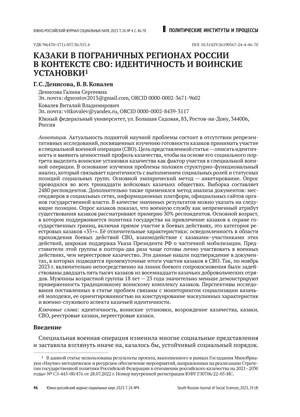Abstract
The topicality of the research problem consists in the lack of representative studies on the commitment of the Cossacks to participate in the Special Military Operation (SMO). The objective of this paper is to describe the Cossacks’ identity and reveal their value profile. This is done in order to highlight the Cossacks’ military attitudes as a factor of participation in SMO, on the basis of their social portrait. The study of the problem is based on structural-functional analysis, which connects identity with the fulfillment of social roles and status positions of social groups. The fundamental empirical method employed was a questionnaire survey. The survey was conducted across all thirteen military Cossack societies. The sample size was 2480 respondents. Additionally, the method of analyzing documents was employed, including messengers in social networks, information platforms, and official websites of public authorities. The following positions can be identified as significant findings. The survey of the Cossacks revealed that approximately 30% of respondents considered military service to be an indispensable aspect of the Cossacks’ existence. The age group most likely to support the state policy of involving Cossacks in border protection, including direct participation in combat operations, is the 35‑plus category. The distinctive characteristics of this group are awareness of SWO combat operations, cooperation with Cossacks participants of these operations, and wide support of the Presidential Decree on partial mobilization. The findings of the study indicate that representatives of this group are between one and a half to two times more willing to personally participate in military actions than non-registered Cossacks. These results were confirmed in the documents summarizing the interim results of Cossack participation in the SMO. Consequently, up to and including November 2023, twenty-five thousand Cossacks from eighteen Cossack volunteer detachments were directly involved in the line of combat resistance (LCR). It is notable that men in the 18–23 age group are much less likely to demonstrate adherence to the traditional military complex of the Cossacks. The potential avenues for further research into the issues raised in the paper include the monitoring of Cossack youth socialization, their orientation towards the construction of masculine characteristics and the military-service aspect of the Cossack identity.
Keywords
Funding information
This paper utilizes the findings of a project conducted as part of the Ministry of Education and Science State Order “Scientific, methodological and resource support for activities that aim to realize the State Policy Strategy of the Russian Federation with regard to the Russian Cossacks for 2021–2030 years” No. SZ-445-00/476 dated 28.07.2022. The SFU internal registration number is GZ0706/22-05-IS.
References
Арсеньев, Н.С. (2022). Возрождение российского казачества как механизм реконструкции культурной памяти: к постановке проблемы. Гуманитарный акцент, 1, 60–77.
Бредихин, А.В. (2022). Гражданская война на Украине: научные подходы и фактор казачества. Вестник Волгоградского государственного университета. Серия 4. История. Регионоведение. Международные отношения, 27(4), 260–269. DOI: 10.15688/jvolsu4.2022.4.23
В г. Москве завершился семинар-совещание «Российское казачество» (2023). Федеральное агентство по делам национальностей России. Режим доступа https://fadn.gov.ru/press-centr/news/v-g.-moskve-zavershilsya-seminar-soveshhanie-rossijskoe-kazachestvo
Вопросы участия казаков в СВО — в федеральной повестке (2022). Черноморское казачье войско. Режим доступа https://vko-chkv.ru/2022/12/20/вопросы-участия-казаков-в-сво-в-феде
Государственная программа Краснодарского края «Казачество Кубани». Администрация Краснодарского края. Режим доступа https://admkrai.krasnodar.ru/upload/iblock/4f7/4f7d84cd573d17e0f910da6e328844fc.pdf
Денисова, Г.С., Ковалёв, В.В. (2023). Казачество в современной России: обретение социального статуса. Вестник Института социологии, 14(3), 14–36. DOI: 10.19181/vis.2023.14.3.2
Дорогие казаки. Финансирование госпрограммы «Казачество Кубани» увеличили (2022). Коммерсантъ. Режим доступа https://www.kommersant.ru/doc/5272270
Казачья казна. Как финансируется и зарабатывает Кубанское казачье войско (2016). Юга.ру. Режим доступа https://www.yuga.ru/articles/society/7711.html
Камшилов, В. (2022). Казаков рано списывать со счета. Русская народная линия. Режим доступа https://ruskline.ru/opp/2022/08/10/kazakov_rano_spisyvat_so_scheta
Кремнев, П.П. (2019). Вооруженный конфликт на Юго-Востоке Украины: правовая квалификация и последствия. Вестник РУДН. Серия: Юридические науки, 23(3), 394–412. DOI: 10.22363/2313-2337-2019-23-3-394-412
Маркедонов, С.М. (2005). Казачество: единство или многообразие? (проблемы терминологии и типологизации казачьих сообществ). Общественные науки и современность, 1, 95–108.
Петряков, Л.Д., Кочура, А.Л. (2022). Вольное сознание: пограничная идентичность и жизнь на рубеже. Вестник Ивановского государственного университета. Серия: Гуманитарные науки, 3, 189–195. DOI: 10.46726/H.2022.3.20
Федеральный закон от 05.12.2005 №154-ФЗ «О государственной службе российского казачества». Режим доступа https://base.garant.ru/188922/
Шидов, А.З. (2021). Элементы культуры казачества в духовно-нравственном воспитании военнослужащих-контрактников. Конструктивные педагогические заметки, 9(1), 10–21.
Arnold, R. (2021). The Role of Cossacks in Russia’s Soft Power Toolkit. PONARS Eurasia Policy Memo, 728. Retrieved from https://www.ponarseurasia.org/the-role-of-cossacks-in-russias-soft-power-toolkit
Barrett, T.M. (1999). At the Edge of Empire: the Terek Cossacks and the North Caucasus Frontier, 1700–1860. Oxford: Westview Press.
Baranec, T. (2014). Russian Cossacks in Service of the Kremlin: Recent Developments and Lessons from Ukraine. Russian Analytical Digest, 153, 9–12.
Bureychak, T., Petrenko, O. (2015). Heroic Masculinity in Post-Soviet Ukraine: Cossacks, UPA and “Svoboda”. East/West: Journal of Ukrainian Studies, II(2), 3–27. DOI: 10.21226/T2988X
Darczewska, J. (2017). Putins Cossacks: Folklore, Business or Politics. Point of View, 12, 1–64.
Grinev, A. (2021). The Participation of the Siberian Cossacks in the Opening Up and Colonization of America. The Journal of Slavic Military Studies, 33(3), 381–383. DOI: 10.1080/13518046.2020.1824103
Kappeler, A. (2013). Die Kosaken: Geschichte und Legenden. Munich: Verlag C.H. Beck.
Kuraev, A., Artemyeva, S., Azmetova, R., Dmitrieva, S., Pallotta, V. (2019). The Don Cossacks and Orthodoxy Religious and Moral Traditions in the Framework of Modern Education. European Journal of Science and Theology, 15(4), 127–135.
Maltseva, L. (2020). We are Studying the History of its Edge with the Help of Art (Kuban Cossacks). The Scientific Heritage, 44, 29–31.
O’Rourke, S. (2000). Warriors and Peasants: The Don Cossacks in Late Imperial Russia. New York: St. Martin’s College.
Petiniaud, L. (2015). The Cossacks and their Legacy as National Symbols in Post-Maidan Ukraine. The Renewal of a Shifting National Myth. In ASN World Convention Columbia University. New York: Columbia University. Retrieved from https://www.academia.edu/15838955/The_Cossacks_and_their_legacy_as_National_Symbols_in_post_Maidan_Ukraine
Yurchenko, I. Yu. (2013). Study of Cossacks in the First Decade of XXI Century: Dynamics of Research and Publications. In the World of Scientific Discoveries, Series A, 1(1), 153–162.


